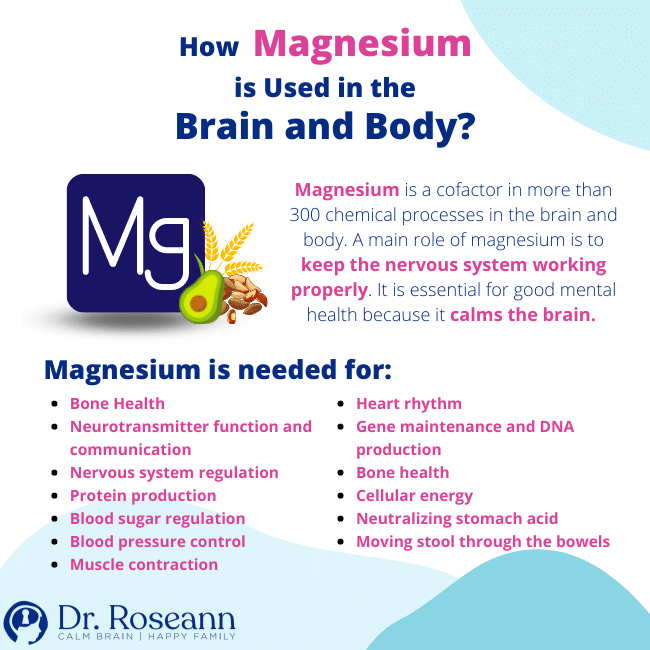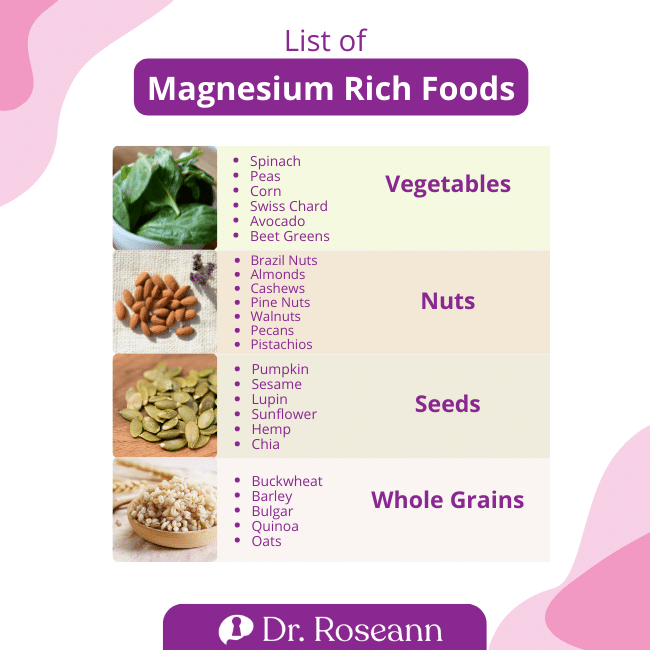Magnesium is increasingly used as a treatment for many clinical health issues. Research supports symptom reduction in several clinical issues including, ADHD, anxiety, depression, OCD, and schizophrenia.
Whenever parents ask me which supplement they regret not taking sooner, hands-down magnesium is the clear winner. And why? Magnesium is a supplement that has many noticeable benefits but the thing that most people see in their kids and feel in themselves is calming. It calms the brain and thoughts, which tamps down stress.
Magnesium is an essential nutrient in neurotransmitter function and communication. Magnesium calms the nervous system due to its ability to block brain N-methyl D-aspartate receptors (NMDA), which inhibits excitatory neurotransmission. It also is needed within the central nervous system because of its role in cellular transmission and intracellular signal transduction.
How Magnesium is Used in the Brain and Body?

Magnesium is a cofactor in more than 300 chemical processes in the brain and body. A main role of magnesium is to keep the nervous system working properly. It is essential for good mental health because it calms the brain.
Magnesium is needed for:
- Bone Health
- Neurotransmitter function and communication
- Nervous system regulation
- Protein production
- Blood sugar regulation
- Blood pressure control
- Muscle contraction
- Heart rhythm
- Gene maintenance and DNA production
- Bone health
- Cellular energy
- Neutralizing stomach acid
- Moving stool through the bowels
Types of Magnesium for Brain Health
There are different forms of magnesium and each has a different effect on the brain and body. Some help with body discomfort, some improve bowel function and others calm the mind and reduce stress. They all are valuable additions to a health regime and can be found in food or magnesium supplement forms.
- Magnesium chloride
- Magnesium sulfate
- Magnesium citrate
- Magnesium oxide
- Magnesium glycinate
- Magnesium orotate
- Magnesium L-threonate
Magnesium Chloride
Is a dietary supplement used to improve bone health.
Magnesium Sulfate
Also known as Epsom Salts is known as the athlete's magnesium. It is used to relieve muscle cramps and as a laxative.
Magnesium Citrate
Is an oral form of magnesium used for cramps, stress reduction and as a laxative. It is also used to improve bone and cardiac health.
Magnesium Oxide
This dietary supplement supports digestion and eases heartburn. Oxidate can also lower anxiety levels.
Magnesium Glycinate
Glycinate has been shown to have a variety of benefits, including increasing focus, relieving anxiety and depression, promoting bone health. managing blood sugar in people with diabetes, reducing pain, reducing PMS symptoms and supporting cardiac health.
Magnesium Orotate
Is an absorbable form of magnesium used to support cardiovascular, bone and gastrointestinal health.
Magnesium L Threonate
Is a form of magnesium that crosses the blood-brain barrier and supports brain and nerve function. It can improve cognitive function, attention and reduce stress levels. It has been used to treat attention problems, cognitive issues, anxiety, OCD and depression.
Signs of Low Magnesium
Low magnesium levels are common amongst the US population with 75% not getting the recommended amount (WHO, 2009). That means they are ingesting less than the 400 mg daily requirement of magnesium from food.
- Feeling stressed or anxious
- Poor sleep quality
- Difficulty getting to sleep
- Have a diagnosed clinical mental health condition
- Fatigue and muscle weakness
- Slowed growth
- Loss of appetite
- Nausea
- Muscle spasms and cramps
- Hyperactive reflexes
- Seizures
- Tingling
- High blood pressure
- Asthma
- Irregular heartbeat
- Osteoporosis
- Poor blood sugar control
Clinical Conditions Related to Low Magnesium Levels
Magnesium is so important in the brain and body that when levels are low, many clinical mental health and medical issues can result. Magnesium plays a role in how the brain functions and a magnesium deficiency is related to both mental and physical issues.
- Anxiety
- ADHD
- Depression
- Chronic Fatigue Syndrome
- Seizure Disorder and Epilepsy
- Parkinson's Disease
- Insomnia and sleep problems
- Headaches
- Migraine
- Osteoporosis
- Premenstrual syndrome
- Chest pain (angina)
- Cardiac arrhythmias
- Coronary artery disease and atherosclerosis
- Hypertension
- Type 2 Diabetes
- Asthma
Why is Getting Magnesium From Food Not Enough?
We always want to get as much nutrients as we can from our food but getting enough Magnesium from our food when we are trying to improve mental health may be a challenge.
So what causes magnesium deficiency even when we try to eat more nutrient dense foods to up our magnesium intake? There are a variety of factors that impact absorption.
Causes of Magnesium Deficiency
Biochemical Individuality:
There are many factors that determine how much magnesium an individual person needs for healthy nervous system regulation. Genetics, gut health, metabolism, physical and mental health conditions, diet and stress all influence magnesium usage and needs of the CNS and body.
Increased Stress Levels:
High stress levels within the body and nervous system require a tremendous amount of magnesium in order to function properly. When in a sympathetic dominant state, which is always the case with clinical issues such as anxiety, OCD and depression, one can’t ingest enough magnesium dense foods to keep up with increased demands. That means the CNS simply can’t work properly, which impacts neurotransmitter function.
You are on Medications that Interfere with Absorption:
Certain medications have been shown to reduce magnesium levels in the body by increasing the excretion of magnesium by the kidneys.
Water Source:
Urban water is treated with fluoride, which binds with any magnesium present, and creates a compound that enters the bones, increasing the brittleness of bones.
Modern Day Farming:
Current farming processes depletes the soil of its natural magnesium, which means less magnesium is available in the food we eat. In particular, certain fertilizers reduce magnesium levels in the soil.
Standard American Diet (SAD):
The Standard American Diet not only is nutrient deficient but is high in foods filled with chemicals that can interfere with magnesium absorption.
You Have Refined Carbohydrates and Sugar:
Refined sugar causes the body to excrete magnesium through the kidneys. Extra sugar consumption depletes magnesium stores.
You Drink Carbonated Beverages:
Dark colored sodas typically contain phosphates, which is a substance that binds with magnesium inside the digestive tract, rendering it unavailable to the body.
You Have Beverages with Caffeine:
Caffeine causes the kidneys to release extra magnesium even if our body needs it.
How to Increase Magnesium Levels
The current RDA for magnesium for adults and children ages 4 and older is 400 mg and ideally it should come from what you eat. Numerous factors are related to why we are low in magnesium. While some can be addressed, others may be more of a challenge and direct supplementation may be necessary.
The positive effects of magnesium on the brain are great and it plays important roles in so many functions that it is worth trying to increase your magnesium intake.
Magnesium Rich Foods
Food is the ultimate medicine and there are many magnesium rich foods that are easy to add into one’s repertoire. Once you start incorporating magnesium rich foods into your child’s diet, it can help improve their magnesium levels and significantly impact their attention and impulse control.
Due to a number of digestive factors, only 20-40% of magnesium is actually absorbed through our food (Bohn, 2008).
List of Magnesium Rich Foods

Vegetables
- Spinach
- Peas
- Corn
- Swiss Chard
- Avocado
- Beet Greens
Nuts
- Brazil Nuts
- Almonds
- Cashews
- Pine Nuts
- Walnuts
- Pecans
- Pistachios
Seeds
- Pumpkin
- Sesame
- Lupin
- Sunflower
- Hemp
- Chia
Whole Grains
- Buckwheat
- Barley
- Bulgar
- Quinoa
- Oats
Magnesium Supplementation for Better Mental Health
Supplementing with magnesium can be a powerful tool in improving mental health. In my blog, 5 Surprising Ways Magnesium Helps ADHD, Anxiety, OCD and Depression, I discuss how important it can be in improving mental health. Research shows that magnesium can improve symptoms related to mental health.
Magnesium Improves Mental Health
- Calms the Brain
- Improves ADHD Behaviors
- Magnesium Improves Brain Chemicals that Help Anxiety, OCD, Depression, and ADHD
- Magnesium Puts The Breaks on the Intrusive Thoughts
- Magnesium Helps Reduce Anxiety
The minimum RDA recommended amount of magnesium for adults is 400 mg and when one is struggling with a clinical mental health issue, more magnesium may be necessary.
Magnesium is my number one favorite supplement for brain health because we are so depleted in it and we need it for our brain to work properly. There is a correlation in the rise in mental health issues and low magnesium levels. Remember less than 75% of the US population is getting less than RDA recommended amount of 400 mg and that means our brain and body isn’t working optimally,
L-threonate and glycinate are two of my favorite forms of magnesium for mental health symptoms. All forms of magnesium are important and I personally use them all.
Citations:
Black, L. J., Allen, K. L., Jacoby, P., Trapp, G. S., Gallagher, C. M., Byrne, S. M., & Oddy, W. H. (2015). Low dietary intake of magnesium is associated with increased externalising behaviours in adolescents. Public health nutrition, 18(10), 1824–1830. https://doi.org/10.1017/S1368980014002432
Bohn T. Dietary Factors Influencing Magnesium Absorption in Humans. Current Nutrition & Food Science. 2008;4:53-72.
Botturi, A., Ciappolino, V., Delvecchio, G., Boscutti, A., Viscardi, B., & Brambilla, P. (2020). The Role and the Effect of Magnesium in Mental Disorders: A Systematic Review. Nutrients, 12(6), 1661. https://doi.org/10.3390/nu12061661
DiNicolantonio, J. J., O'Keefe, J. H., & Wilson, W. (2018). Subclinical magnesium deficiency: a principal driver of cardiovascular disease and a public health crisis. Open heart, 5(1), e000668. https://doi.org/10.1136/openhrt-2017-000668
Keshteli, A., Afshar, H., Esmaillzadeh, A., & Adibi, P. (2018). The association between dietary intake of magnesium and psychiatric disorders among Iranian adults: a cross-sectional study. The British journal of nutrition, 120(6), 693–702. https://doi.org/10.1017/S0007114518001782
Mousain-Bosc, M., Roche, M., Rapin, J., & Bali, J. P. (2004). Magnesium VitB6 intake reduces central nervous system hyperexcitability in children. Journal of the American College of Nutrition, 23(5), 545S–548S. https://doi.org/10.1080/07315724.2004.10719400
Portnoy, J., McGouldrick, S. H., Raine, A., Zemel, B. S., Tucker, K. L., & Liu, J. (2021). Lower dietary intake of magnesium is associated with more callous-unemotional traits in children. Nutritional neuroscience, 1–10. Advance online publication. https://doi.org/10.1080/1028415X.2021.1963064
Starobrat-Hermelin, B., & Kozielec, T. (1997). The effects of magnesium physiological supplementation on hyperactivity in children with attention deficit hyperactivity disorder (ADHD). Positive response to magnesium oral loading test. Magnesium Research, 10(2), 149–156.
World Health Organization. Calcium and Magnesium in Drinking Water: Public health significance. Geneva: World Health Organization Press; 2009.
Always remember… “Calm Brain, Happy Family™”
Are you looking for SOLUTIONS for your struggling child or teen?
Dr. Roseann and her team are all about solutions, so you are in the right place!
There are 3 ways to work with Dr. Roseann:
You can get her books for parents and professionals, including: It’s Gonna Be OK™: Proven Ways to Improve Your Child’s Mental Health, Teletherapy Toolkit™ and Brain Under Attack: A Resource For Parents and Caregivers of Children With PANS, PANDAS, and Autoimmune Encephalopathy.
If you are a business or organization that needs proactive guidance to support employee mental health or an organization looking for a brand representative, check out Dr. Roseann’s media page and professional speaking page to see how we can work together.
Dr. Roseann is a Children’s Mental Health Expert and Therapist who has been featured in/on hundreds of media outlets including, CBS, NBC, FOX News, PIX11 NYC, The New York Times, The Washington Post,, Business Insider, USA Today, CNET, Marth Stewart, and PARENTS. FORBES called her, “A thought leader in children’s mental health.”

She is the founder and director of The Global Institute of Children’s Mental Health and Dr. Roseann Capanna-Hodge. Dr. Roseann is a Board Certified Neurofeedback (BCN) Practitioner, a Board Member of the Northeast Region Biofeedback Society (NRBS), Certified Integrative Medicine Mental Health Provider (CMHIMP) and an Amen Clinic Certified Brain Health Coach. She is also a member of The International Lyme Disease and Associated Disease Society (ILADS), The American Psychological Association (APA), Anxiety and Depression Association of America (ADAA) National Association of School Psychologists (NASP), International OCD Foundation (IOCDF) International Society for Neurofeedback and Research (ISNR) and The Association of Applied Psychophysiology and Biofeedback (AAPB).
© Roseann-Capanna-Hodge, LLC 2023
Disclaimer: This article is not intended to give health advice and it is recommended to consult with a physician before beginning any new wellness regime. *The effectiveness of diagnosis and treatment vary by patient and condition. Dr. Roseann Capanna-Hodge, LLC does not guarantee certain results.














